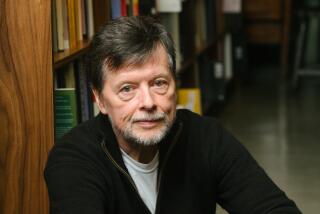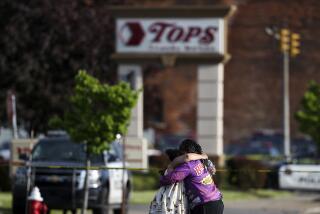Buffalo Focus of Terror Funds Probe
- Share via
LACKAWANNA, N.Y. — Sure, Hizam Mortade said, as he lugged two crates of tomatoes from his truck into a grocery store, he sends money back to Yemen. He’s done it every payday since he came to the United States nine years ago. The dollars are crucial to his family, most of all to his mother, who has diabetes.
And yes, he knows federal investigators are trying to track money sent to the Middle East from this down-at-the-heels steel town, fearing it may help fund the Al Qaeda terrorist network. “That’s crazy,” he said. He set the tomatoes next to a pile of lettuce and paused to explain why he thought so.
“Look at Lackawanna,” he said. “It’s poor. We’re all poor. The reason we came to the United States was to make money to take care of our families. Why would Al Qaeda, that has all the money in the world, need our money? This whole town couldn’t put together the money to buy a single missile even if it wanted to.”
But federal authorities acknowledge that they have been investigating western New York as a source of Al Qaeda funding as part of an operation that on Sept. 13 resulted in the arrest of six Yemeni Americans who, the government charges, were part of a terrorist “sleeper cell” in Lackawanna. The funding probe, first reported by the Buffalo News, involves the FBI, the Internal Revenue Service’s criminal investigation unit and the U.S. Customs Service office in Buffalo, five miles away.
Millions of dollars flow annually from the Buffalo area, where an estimated 5,000 Arab Americans live, to the Middle East, federal authorities said. Most transactions are in cash because many Arabs, including Yemenis, come from societies where banks are distrusted and few citizens have bank accounts. The majority of the transactions are legal, and, like Mortade’s, are destined to help relatives back home.
“Every immigrant community sends large sums home when they settle in the United States, and Muslim families are not unique in that respect,” said Dr. Khalid Qazi, a Kashmiri, who is president of the American Muslim Council’s local chapter.
“But since 9/11, cash transfers have been viewed with suspicion. I tell friends, ‘You’ve been here 20 years. Why are you still sending cash, even if it’s 100% legitimate? Cash is tainted. It’s a habit you ought to break. Use the banks.’ ”
The focus of the government’s probe appears to be what role, if any, cigarette smuggling plays in financing Al Qaeda. One smuggling scheme involving several local Arab Americans, some of Yemeni descent, was broken up in 1999. The suspects were charged with sending more than $1 million in illegal profits to Yemen. There are no allegations that the six Lackawanna men--who are at the federal detention center in Batavia, N.Y., pending a judge’s decision on whether to free them on bond--were raising money for Al Qaeda. They are named in a criminal complaint for providing “material assistance” to terrorists by attending an Afghanistan training camp in the spring of 2001, well before the Sept. 11 attacks, for periods of 10 days to six weeks each. They are not charged with carrying out or planning terrorist acts.
U.S. Magistrate H. Kenneth Schroeder said he will rule by Thursday on their attorneys’ motion to free the men on bond, based on whether he thinks they are a danger to the community or a risk to flee the country. Their families have said they are prepared to post bail, using their homes as security, if freedom is granted.
“There are a lot of emotions about this case,” said Dennis O’Hara, chief of Lackawanna’s 51-member police department. “Frankly, if they are freed, I am not sure I can guarantee their safety. From a security point of view, they might be better off staying where they are, in the detention center.”
The government remains tight-lipped about its investigation, and the FBI and other federal agencies in Buffalo refer reporters’ questions to their headquarters in Washington. It remains unclear why the arrests were made on Sept. 13, after the FBI had maintained a high-profile presence in Lackawanna for weeks, or why they were announced with great fanfare in Washington, coinciding with an increased national security alert to level orange.
“There are certain things that still don’t make sense,” said Rodney Personius, the attorney for one suspect, Yasein Taher, 24. “In a normal federal criminal investigation, the FBI and others are generally proactive, gathering the evidence, then charges are laid. Here it seems the evidence is being gathered to support charges already laid.”
In addition to Taher, the suspects are Sahim Alwan, 29; Faysal Galab, 26; Yahya Goba, 25; Shafal Mosed, 24; and Mukhtar al-Bakri, 22, who was arrested in Bahrain. Two other Lackawanna men named as co-conspirators but not charged are being sought and are believed to be outside the country: Jaber el-Baneh and Kamal Derwish, the alleged ringleader of the cell.
More to Read
Sign up for Essential California
The most important California stories and recommendations in your inbox every morning.
You may occasionally receive promotional content from the Los Angeles Times.













